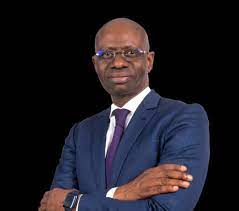APA-Dakar (Senegal) Boubacar Camara, 65, is one of the 19 candidates
in the presidential election and, if elected on 24 March, he intends
to use his many hats to lead Senegal.
Boubacar Camara, who was born on 26 June 1958 in Dakar and has a wealth of academic and professional experience, is the campaign manager for opponent Ousmane Sonko in the 2019 presidential election.
After an unsuccessful attempt to run in 2019, the president of the Construction and Solidarity Party (PCS-Jengu Tabax), who came to politics late in 2018, is one of the candidates selected by the constitutional court for the ballot on 25 February 2024, which has finally been set for 24 March of this same year.
With a wealth of experience in various sectors such as the army, the
Inspectorate General of the State (IGE), the National Navy, the Bar and the customs administration in Senegal and Benin, Mr. Camara is now looking to move up a notch by reaching the highest office in the land.
In his programme entitled “Tabax Senegaalu Eleg,” or building the Senegal of the future, he explains that his political vision, in a 60-page manifesto articulated around six strategic axes, is based on participatory and inclusive citizenship.
Health and education, “the bedrock of human capital,” will play an important role in his governance, as will the “judicious exploitation of our natural resources” and the protection and promotion of our cultural and religious heritage. Openness to Africa and Senegal’s place in the world, as well as environmental protection, will also feature prominently in its management.
To implement this programme, the former soldier second class in the
Senegalese army intends to work on “25 priority measures” if he is elected as the fifth president of Senegal.
Competitive business sectors
The leader of PCS-Jengu promises “free” education up to the age of 25,
financed by a revolving fund of 8,000 billion CFA francs. In return,
education will be “compulsory” up to the age of 16 in all school
systems, including daaras or Koranic schools. In addition to these
commitments to the education sector, this maritime expert promises to
create a National Scientific Research Centre with an initial endowment
of 50 billion CFA francs.
The former Director General of Senegalese Customs also intends to
create a right to a minimum income from the age of 17, supported by
what he calls the Mbèl Solidarity Fund drawn from natural resources.
Under his leadership, medical catch-up will become a reality in five
years, with a budget of 1,000 billion CFA francs per year, as will the
industrial processing of agricultural, livestock and fisheries
products.
To farmers, this graduate, who has a Doctorate in Law and graduated from the Ecole de Formation du Barreau (Bar Training school) in Paris, where he obtained his bar exam in October 2008, promises to raise the price of a kilogram of groundnuts to 500 CFA francs.
At a time when many Senegalese continue to complain about congestion in Dakar, he wants to transfer the administrative capital to the region of Thies, “the city of rail,” which will play a central role in setting up an industrial iron chain and revitalising the rail network. Mr. Camara is also thinking of his compatriots working abroad, for whom he is going to create the company “Diaspora SA” with an associated current account holding of 300 billion CFA francs.
He will also institute a presidency/vice-presidency ticket on a parity basis for a five-year term and a maximum stay of ten years during his lifetime. His government will be made up of 15 ministers, 36 directors-general chosen on the basis of calls for candidates, and nine secretaries of state.
Institutional reform
With the former Chairman of the Board of Directors of SOCOCIM Industries, a cement company, the political composition of certain consultative institutions will be reduced to better rationalise state budget. The Economic, Social and Environmental Council, which currently has 120 members, will be replaced by a 25-member Economic and Social Orientation Council. The 15-member Conseil Supérieur des Collectivités Territoriales will also take over from the 150-member
Haut Conseil des Collectivités Territoriales.
If he becomes the next president, the former Deputy Director General of Benin’s Customs administration will not hesitate to put up 4,000 billion CFA francs to finance infrastructure in Senegal. He will be looking for funding from natural resource revenues and public-private partnerships. The former Permanent Secretary of the Ministry of International Cooperation, Air Transport, Infrastructure and Energy under President Abdoulaye Wade (2000-2012) will also
institute a border security cordon around sensitive sites to protect goods and people to the tune of 26 billion CFA francs.
In addition to creating the Senegalese Handicrafts Office (OSA) with a budget of 350 billion CFA francs, the former Chairman of the Board of Directors of Senegal
Airlines will reform and promote the tourism and culture sectors. This promotional work will be extended to the West Atlantic Federation (WAF) between The Gambia, Guinea, Guinea-Bissau and Senegal, while he promises to definitively resolve the suffering of women and young girls by increasing health infrastructures, developing remedial literacy for women and boosting schooling for young girls.
To combat youth unemployment and illegal emigration, Boubacar Camara
promises to introduce more appropriate and effective public policies.
He will support women’s and young people’s businesses involved in the
processing of agricultural, pastoral and fisheries products, and will
promote major integrated environmental projects.
Finally, Camara’s manifesto gives priority to promoting the use of renewable energies, such as wind and solar power, with a view to reducing greenhouse gas emissions and encouraging a shift to a more sustainable economy.
ODL/ac/fss/as/APA


